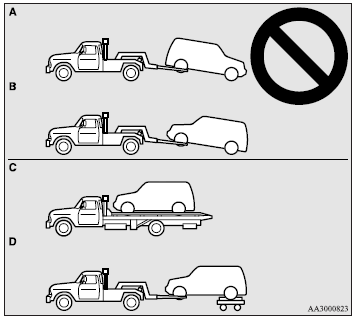 Mitsubishi Outlander: Cautions on the handling of 4-wheel drive vehicles
Mitsubishi Outlander: Cautions on the handling of 4-wheel drive vehicles
Tyres and wheels
Since the driving torque can be applied to the 4 wheels, the driving performance
of the vehicle when operating in 4-wheel drive is greatly affected by the condition
of the tyres. Pay close attention to the tyres.
● Install only the specified tyres on all wheels. Refer to “Tyres and wheels” on
page 9-9.
● Be sure all 4 tyres and wheels are the same size and type. When it is necessary
to replace any of the tyres or wheels, replace all four.
● All tyres should be rotated before the wear difference between the front and rear
tyres is recognisable. Good vehicle performance cannot be expected if there is a
difference in wear between tyres. Refer to “Tyre rotation” on page 8-15.
● Check the tyre inflation pressure regularly.
CAUTION:
● Always use tyres of the same size, type, and same brand that have no wear differences.
Using tyres of different size, type, brands or degree of wear, will increase the
differential oil temperature and result in possible damage to the driving system.
Further, the drive train will be subject to excessive loading, possibly leading
to oil leakage, component seizure, or other serious failures.
Towing

CAUTION:
● Do not tow 4-wheel drive vehicles with the front or rear wheels on the ground
(Type A or Type B) as illustrated. This could result in damage to the drivetrain,
or unstable towing. If you tow 4-wheel drive vehicles, use Type C or Type D equipment.
● Even in “2WD” drive mode, the vehicle cannot be towed with the front or the rear
wheels on the ground.
Jacking up a 4-wheel drive vehicle
WARNING:
● Do not crank the engine while jacking up the vehicle. The tyre on the ground may
turn and the vehicle may roll off the jack.
Clutch operation
Quick or slight clutch engagement made while the engine is running at high speed will cause damage to the clutch and transmission because the tractive force is very great. Operate the pedal slowly and positively.
 Inspection and maintenance following rough road operation
Inspection and maintenance following rough road operation
After operating the vehicle in rough road conditions, be sure to perform the
following inspection and maintenance procedures:
● Check that the vehicle has not been damaged by rocks, gravel, ...
 Braking
Braking
All the parts of the brake system are critical to safety. We recommend you to
have the vehicle checked at regular intervals according to the service booklet.
CAUTION:
● Avoid driving habits ...
See also:
SRS warning light
This warning light system monitors the airbag sensor assembly, front airbag
sensors, side and curtain shield airbag sensors, curtain shield airbag sensors,
driver's seat position sensor, driver's se ...
Volvo programs
Volvo On Call Roadside Assistance
Your new Volvo comes with a four year ON
CALL roadside assistance. Additional information,
features, and benefits are described in a
separate information packa ...
Fog light switch (if so equipped)
To turn the fog lights on, turn the headlight
switch to the position, then turn
the switch
to the position. To turn them off,
turn the
switch to the OFF position.
The headlights must be ...
